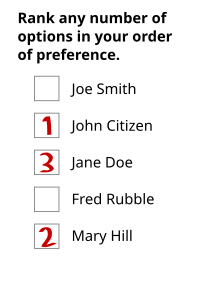| A joint Politics and Economics series |
| Social choice and electoral systems |
|---|
 |
|
Single-winner methodsSingle vote - plurality methods
|
|
Proportional representationParty-list
|
|
Mixed systemsBy results of combination
By mechanism of combination By ballot type |
|
Paradoxes and pathologiesSpoiler effects
Pathological response Paradoxes of majority rule |
Social and collective choiceImpossibility theorems
Positive results |
|
|

A first-preference is a voter's most-preferred candidate. In certain ranked systems such as first preference plurality, ranked-choice voting (RCV), and the single transferable vote, first preferences for a candidate are considered most important and prioritized heavily. This incentivizes pandering to the political base or "core support" as a result of the center squeeze effect. Methods like Condorcet voting, rated voting, and the Borda count do not exhibit such effects. Methods like anti-plurality voting and Coombs' method have the opposite effect, being dominated by a voter's bottom rankings and so tending to elect the "least offensive" candidates.
First-preference votes are used by psephologists and the print and broadcast media to broadly describe the state of the parties at elections and the swing between elections. The term is much-used in Australian politics, where ranked voting has been universal at federal, state, and local levels since the 1920s.
References
- "Explainer: What is preferential voting?". Special Broadcasting Service. Retrieved 10 August 2024.
- "How the Dáil is Elected" (PDF). Department of the Environment, Community and Local Government, (Ireland). November 2014. p. 10. Retrieved 24 May 2015.
- ""Full transcript - David Cameron - The case against AV - London - 18 February 2011"". New Statesman. 18 February 2011. Retrieved 24 May 2015.
- ^ "By-Election: Carlow-Kilkenny". RTÉ. 23 May 2015. Retrieved 24 May 2015.
- "First Preference Vote". University of Western Australia. Retrieved 24 May 2015.
- "Cooma-Monaro Shire Council: Summary of First Preference Votes for each Candidate". Local Government Elections 2012. Electoral Commission of New South Wales. 14 September 2012. Retrieved 7 October 2012.